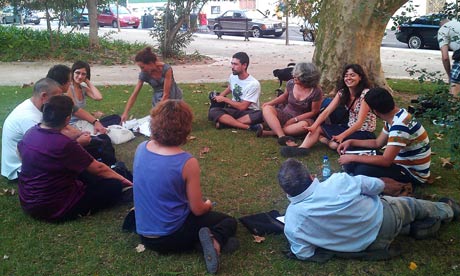'Portugal's market has died. Banks aren't lending. Everything is blocked'
Jon Henley in Lisbon · 12/10/2011 · guardian.co.uk
Jon Henley is travelling through Portugal, Spain, Italy and Greece to hear the human stories behind the European debt crisis. In Lisbon he meets Indignados Lisboa, a growing movement of activists who say young people are in despair

Indignados Lisboa planning Saturday's demonstration in the Portuguese capital. Photograph: Jon Henley for the Guardian
There are maybe a 20 of them, sitting cross-legged on the grass as the shadows lengthen across the Príncipe Real gardens in Lisbon. A graphic designer, a primary school teacher, two economists, a photographer, a business intelligence analyst, an antique restorer, a tourist guide, aged from their mid-20s to their late 50s.
This evening they're debating the main event of the weekend: Saturday's demonstration and march through the Portuguese capital, finishing with a "people's assembly" in front of the parliament building. What happens after that, they're not quite sure; Lisbon's last major protest parade, in March, saw 500,000 people take to the streets.
Indignados Lisboa, inspired by the Arab spring and the 15M movement in Spain, brings together people from all backgrounds: "Some are students," says Luis Alves, a 30-year-old freelance graphic designer and one of the movement's members. "Others took part in the 1974 revolution, and are sorry it didn't bring about the society it should have."
They are united by a desire for change.
"We believe that the people really do have the power," continues Alves. "People think someone else will fix this, but we have to. The people who are supposed to find solutions, our elected representatives, clearly aren't. We have to show we're not merchandise in the hands of bankers and businessmen."
The movement's aims are ill-defined ("It's normal, we're only just beginning," says Alves) but boil down, explains Pedro Murteira, a social education student, to common sense. A more participative democracy: a system that works for the good of all rather than the profit of a few.
"Something has to change," says Alves. "We are not a rich country; the minimum wage here is just €485 [£425 a month] – even in Greece it's €600. But taxes are going up, electricity's being hiked by 30%, public transport too. People are getting desperate. There's real despair.
"I have many friends who are thinking of emigrating. Only two of my friends have proper job contracts. I'm lucky, most of my work is for people outside of Portugal. The market here has died. Banks aren't lending. Everything, economically and politically, is blocked."
Murteira says he hopes the crisis will lead to "a whole new way of organising our lives, and of consuming. Not a personal perspective, but a collective perspective. Because the real problem isn't the crisis, it's the system. There's a slogan, you know? No jobs, no houses, no security, no prospects – so no fear."
After the May protests in neighbouring Spain, 50 or 60 Portuguese Indignados camped out for a week in Rossio square. They were heartened, Alves and Murteira say, by people's reactions: elderly women who came to give them money; men in suits who brought bags of buns for breakfast.
"Sometimes," says Murteira, "I think people understand. Then I walk through town on a Saturday night and I see the clothes and the shops and the consumption, and I doubt. But look, we have to come to our senses. The problems we face are so complex that we can only really solve them by a wholly new way of doing politics."
• If you have a story to tell, know a person I should talk to or live in a place you think I should visit, please contact me: jon.henley@guardian.co.uk, or @jonhenley(the hashtag for this venture is #EuroDebtTales)

Sem comentários:
Enviar um comentário